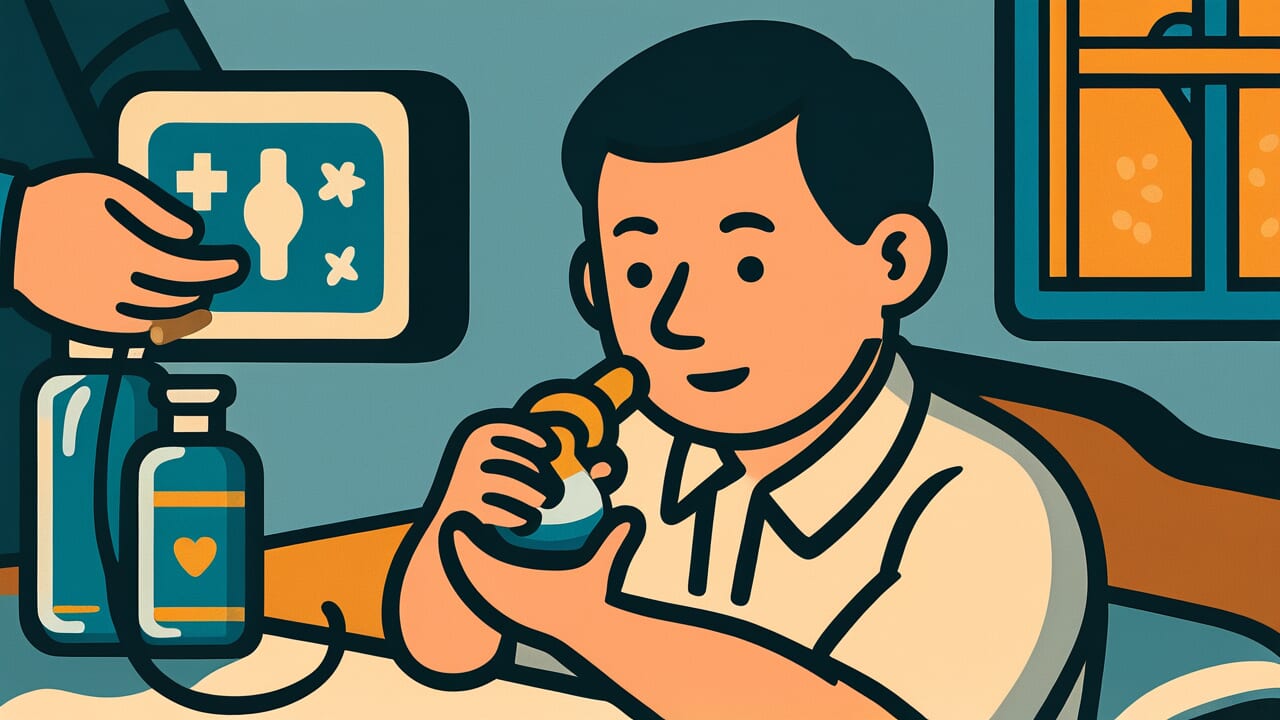How to Read “Hurry medicine after being born”
Umareta ato no hayame gusuri
Meaning of “Hurry medicine after being born”
This proverb means that taking medicine after you get sick is too late. It teaches us the importance of preparing before problems happen, not dealing with them after they occur.
People use this saying when someone rushes to fix a problem that’s already happened. They’re telling that person “it’s too late now.”
For example, you might use it for someone who starts studying the night before a test. Or for someone who tries to change their lifestyle only after a health checkup shows problems.
This expression works better than simply saying “prevention is important.” It creates a vivid image of a situation that’s already too late. This makes the warning much stronger.
By showing the irreversible situation of “after being born,” it emphasizes how crucial advance preparation really is.
This lesson remains important today. In fact, modern people who tend to put things off need this wisdom more than ever.
Origin and Etymology
No clear records exist showing when this proverb first appeared in writing. However, we can make interesting observations from how the phrase is constructed.
The expression “Hurry medicine after being born” seems to contain a contradiction. The words “after being born” and “hurry medicine” combine to create a uniquely ironic tone.
This phrase probably emerged among common people during the Edo period or later. Medical care wasn’t as advanced as today back then.
Taking medicine after getting sick often came too late. From such experiences, this teaching about prevention’s importance spread widely.
The term “hurry medicine” means “medicine taken early.” But by placing “after being born” before it, the phrase expresses a paradoxical meaning.
It says “no matter how quickly you take medicine after already being born, it’s meaningless.”
This expression method shows the cleverness of Japanese wordplay. Instead of directly saying “prevention is important,” it shows a too-late situation.
This actually emphasizes the importance of advance preparation even more strongly. Such wisdom from our ancestors lives in these words.
Usage Examples
- Not getting regular checkups and letting your disease progress is exactly like hurry medicine after being born
- Let’s back up our data properly now so it doesn’t become hurry medicine after being born
Universal Wisdom
The proverb “Hurry medicine after being born” reveals a fundamental human weakness. We are creatures who struggle to take action until danger appears right before our eyes.
Why do people neglect prevention? Because problems that haven’t happened yet don’t feel real to us.
When we’re healthy, we forget how scary illness can be. During peaceful times, we underestimate the need to prepare for crises.
This reflects both the limits of human imagination and our naturally optimistic nature.
However, our ancestors understood this human trait well. That’s why they used the example of “after being born”—a situation that’s absolutely irreversible—to warn us.
The brilliance of this expression lies in how it appeals to our hearts through concrete imagery, not just preaching.
This proverb has survived through generations because human nature doesn’t change with time. Ancient people and modern people alike get caught up in immediate concerns.
We all tend to postpone preparing for the future. Our ancestors left us these words because they knew this weakness.
Humans aren’t perfect. But we have the wisdom to recognize our weaknesses and try to compensate for them.
This proverb tells the story of how deeply humans understand themselves.
When AI Hears This
A newborn baby’s condition results from massive amounts of information accumulated during nine months from conception to birth. From an information theory perspective, the information exchanged between mother and fetus during this period reaches astronomical numbers.
For example, nutritional status, hormone balance, and stress levels are countless factors. These affect cell division and organ formation every single second.
What’s important here is that this information becomes “fixed” as the fetus’s physical structure over time. In information theory, when information converts into physical structure, the process becomes irreversible.
In other words, once brain neural network wiring and organ formation patterns are determined, they cannot be undone. Think of it like a computer program.
You can modify code while it’s running. But once execution results are burned into hardware circuits, changes become impossible.
Medicine given after birth has no effect because information couldn’t be input at the necessary intervention timing. Certain organs only form during specific weeks of fetal development.
Miss that period and the information reception window closes. Information theory calls this “temporal dependency of information.”
Physical constraints limit the period when a system can accept information.
Lessons for Today
This proverb teaches you a truth: “Today’s small actions create tomorrow’s big differences.”
In our busy daily lives, we easily get caught up in only what’s right in front of us. We postpone health checkups.
We put off maintaining important relationships. We think about studying new skills “when we have time someday.”
But while we keep postponing, we sometimes realize it’s too late when we finally notice.
What matters isn’t aiming for perfection. It’s accumulating something for the future, even just a little each day. That’s what prevention means.
Enough sleep, balanced meals, moderate exercise. Conversations with family and friends. Time to learn new knowledge.
All of these are investments in your future self.
Your choices today create who you’ll be tomorrow. Instead of panicking after problems arise, why not start good habits now, even small ones?
That’s what it means to take care of yourself.



Comments